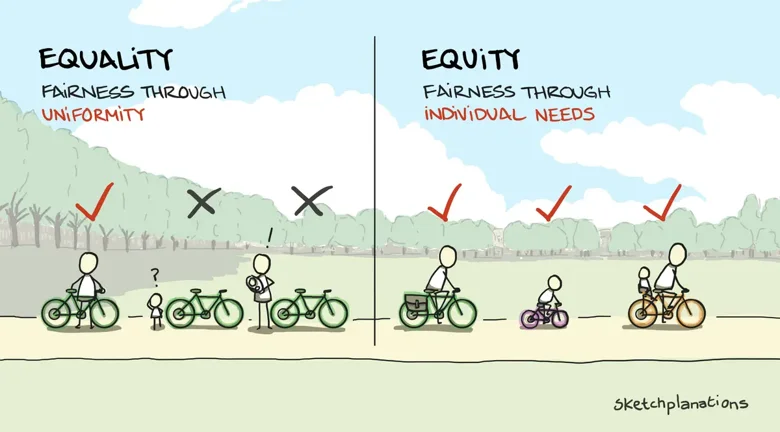
Credit to sketchplanations.com for the cartoon
For me, striving to create an inclusive team is a no-brainer. While equality offers everyone the same opportunities, equity takes it a step further. This reflection explores how focusing on individual needs, rather than simply offering the same opportunities to everyone, can make my team more inclusive.
Jump to heading What an inclusive team means to me
An inclusive team values and respects diverse perspectives, ensuring every voice is heard and appreciated. It fosters a culture of belonging, where all team members feel supported, regardless of their background or identity. Inclusive teams create an environment where collaboration thrives, giving everyone equal opportunities to contribute and grow.
Simply put, I believe an inclusive team is one that celebrates differences, where everyone feels they can be part of shaping how the team operates.
Jump to heading How is equality different from equity
At October's Hargreaves Lansdown Manager Learning Journey training, I was introduced to the concept of equity in the context of inclusion. I hadn't come across this term before and initially struggled to understand the difference.
Equality means each individual or group of people is given the same resources or opportunities.
Equity recognizes that each person has different circumstances and allocates the exact resources and opportunities needed to achieve an equal outcome.
For me, as a manager, this translates to understanding that ensuring everyone has the opportunity to do something doesn’t necessarily mean I’ve created equal opportunities for everyone on the team.
Jump to heading How I want to put equity into practice
My management style is centered around empowerment, creating a culture where the team can carve out their own direction. At times, I’ve been hesitant to encourage someone to take on a task if they feel uncomfortable doing so. For example, not everyone feels confident suggesting technical ideas in a team meeting, often due to a lack of confidence or perceived inexperience. I’ve made a point of "walking the room" and asking everyone to share their perspective on a topic. While this helps to some extent, I realize this is more about equality than equity. I’m giving everyone the opportunity to speak, but not necessarily providing the support they need to contribute meaningfully.
I’m now going to make a conscious effort to provide more support if I feel someone isn’t contributing technical ideas. I’ll start by discussing it with them during our 1:1s, setting a clear goal such as, “At next week’s engineering catch-up, suggest the idea for XX.” We’ll also discuss if they’d like any additional support, such as having me set the context for the idea.
I feel I’ve done this in the past, but now I have a clearer understanding of my role as a manager when it comes to fostering equity within the team.
Jump to heading Conclusion
Inclusive teams ensure that everyone feels they belong and can contribute. Sometimes, this means providing extra support to ensure everyone is able to participate. Equity may seem like a subtle difference, but it's a crucial one as I strive to improve how I empower my team.
If you have any comments/feedback/questions on this article please get in touch! I'd love to know how you ensure you team is inclusive.